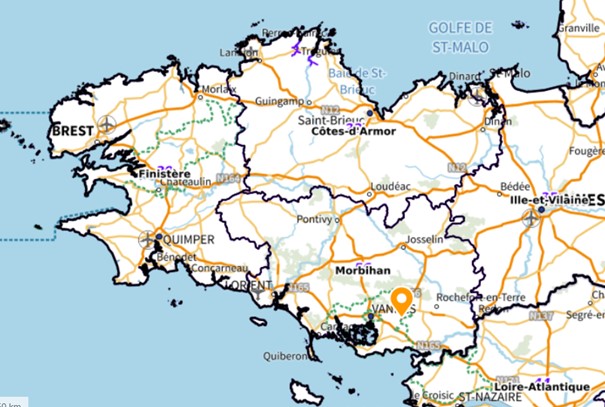Label Bas Carbone certified project
The reforestation project in Sulniac, Morbihan (Brittany), aims to restore the forest using a variety of tree species: Maritime Pine, Atlas Cedar and Pubescent Oak, adapted to the changing climate and poor, stony soil. The Oaks will be planted along the roadside, enhancing the landscape and biodiversity, while the Atlas Cedars planted within the stand will help limit the risk of fire (low-flammability litter, significant shade created on the ground).
Some elements will be preserved to maintain existing habitats: border trees will be maintained to provide refuge for local wildlife, and an old low wall, evidence of the plot's historic layout, will be preserved. This low wall provide shelter for species that thrive in rocky environments. Last but not least, the project will play a role in combating soil erosion on this sloping site. The installation of trees will reduce the risk of erosion and run-off, protecting the Kercoha stream below.

Sulniac, Morbihan (Brittany), 20 km from Vannes
2,1 ha planted
Maritime pine, Atlas cedar, Pubescent oak
About 3150 trees

Located in Sulniac in the Morbihan department, this project is part of the sylvo-ecoregion of southern Brittany, in the heart of the Golfe du Morbihan Regional Nature Park and just 20 km from Vannes. Forests occupy a small part of the territory, around 16%, and face numerous challenges linked to urbanization and the expansion of human activities, particularly around the Vannes conurbation.
In this predominantly bocage landscape, the preservation of this forest helps to reinforce the ecological continuity between the hedgerows and the remaining forest massifs. By restoring these burnt wooded areas, the project contributes to preserving biodiversity and reconnecting the scattered patches of forest in this region of exceptional natural heritage.
The wooded parcel is part of an existing sustainable management docment: The owner has set up a Plan Simple de Gestion, approved by the Centre National de la Propriété Forestière (CNPF).
The Sulniac project is part of the "Reconstitution de forêt dégradée" (Restoration of degraded forest) method of the Label Bas Carbone, a certification examined and issued by the French Ministry of Ecological Transition (DREAL)
The aim of our project is to diversify and mix species (coniferous and deciduous), while taking into account soil conditions and climate change. These species will complement the border trees retained for biodiversity purposes. The Atlas Cedar, with its low-flammability litter and shade-providing understory, and the planting of Oaks, will help limit the risk of rorest fires spreading.
An ancient low stone wall crossing a plot of land has been preserved, in order to maintain specific habitats for rocky fauna
The preservation of this forest area by reforestation, combined with no tillage, helps to limit erosion, while a stream runs alongside the forest below. The roots of the trees help to maintain the soil, this limiting the runoff of particles that can disturb the waters of aquatic environments.
The forestry sector encompasses a wide range of occupations that cannot be relocated: forest managers, nurserymen, forestry work companies (loggers and forest operators in the future). France's wood processing industry also encompasses a wide range of trades, right through to the manufacture of the finished product.